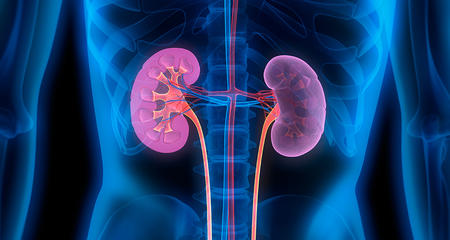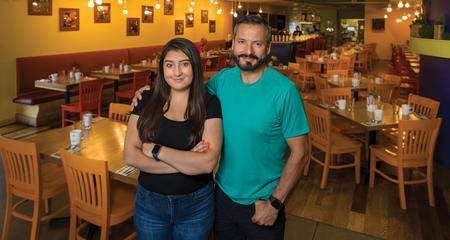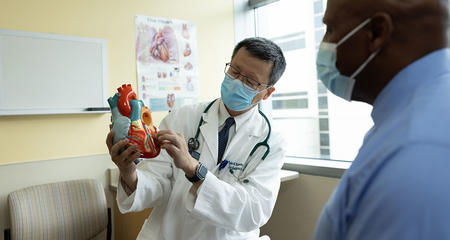-
Do I need to be a blood relative to be a living donor?
No. A living kidney donor may be a relative or a person who is not related to the recipient. In the case of a non-relative, it is best if the donor has an emotional relationship with the recipient.
-
What types of tests will I need in order to qualify as a donor?
If an initial screening determines that you are a potential candidate, you will undergo tests for two primary reasons. First, a set of tests will confirm that your body is healthy enough for the donation process and for life with just one kidney. Second, you will undergo several tests to determine your compatibility with a potential kidney recipient.
-
What tests are conducted to assess my health?
Your care team will want to make sure that your kidneys, heart, lungs, circulatory system and overall physical and mental health are strong. Tests they may request for this reason include a urine test, blood test, chest X-ray, electrocardiogram (EKG), psychosocial evaluation, cancer screening, computed tomography (CT) scan and magnetic resonance imaging (MRI) scan.
-
What tests will determine my compatibility with a recipient?
Several blood tests will be conducted to determine how closely you match the potential recipient. The closer the match, the less chance of rejection for the recipient. Your blood will be tested to confirm your blood and tissue type, to determine crossmatching, and to detect the presence of antibodies and possible transmittable diseases, such as HIV/AIDS and hepatitis. These tests are highly sophisticated and are offered through collaboration with Versiti Blood Center of Wisconsin.
-
What is crossmatching?
Crossmatching is a blood test conducted prior to transplant to determine if a potential recipient will react to the donor’s organ. A "positive" crossmatch indicates that the donor and recipient are not compatible, because the recipient’s body will produce antibodies that will immediately reject the donor’s organ. If the crossmatch is "negative," the transplant may proceed. In some cases, therapies may be used with positive crossmatches to hinder the production of antibodies and make it possible for transplant to proceed. You and your intended recipient may also consider entering into a donor exchange.
-
What are the risks to a living donor?
Based on information currently available, the overall risks associated with kidney donation surgery are considered to be low. The risks are the same as those with any other type of surgery, including pneumonia, blood clots, side-effects of anesthesia and post-operative pain. The risk of death is about one in 3,000. These risks are fully discussed with the donor during the evaluation.
-
How will donation affect my life in the long term?
Transplant centers are required to report living donor follow-up data for two years, which will require routine office visits, laboratory tests and other possible interaction for you. Your care team would like to be your transplant care resource for life, however, and will be available to you for questions and care for as long as you would like. Donors are not more likely to develop kidney disease in the future just because they have one remaining kidney. In fact, statistically, living donors have a longer life expectancy than the general population. This is because the evaluation process for donors selects individuals who have above-average health.
-
Will kidney donation affect my mental health?
The decision to donate an organ is one of the biggest you will make in your life. If the transplant does not succeed for some reason or you have resulting medical problems, you may have feelings of regret, resentment or anger and may experience anxiety or depression. The majority of living donations are successful, and you can anticipate feeling positive about giving the gift of life to someone in need. Your donation also will help reduce the waiting list for other donors.
-
What lifestyle changes should I anticipate?
When a kidney is removed, the remaining kidney will increase in size to make up for the donated kidney. Many experts recommend that anyone with a single kidney avoid activities which could injure the kidney. Good long-term medical follow-up with an annual urine test, blood test and blood pressure check is recommended. Pregnancy following donation is permissible, but experts recommend that women wait at least six months and have excellent pre-natal care. Donors in good health do not usually need dietary restrictions, but maintaining your ideal weight through healthy nutrition and excise will help you feel your best after donation.
-
Can I talk to someone who has been through the process?
Yes. Ask your transplant coordinator to put you in touch with others who have been living kidney donors through our program. Additionally, you can read stories submitted by hundreds of living organ donors by visiting transplantliving.org, sponsored by UNOS,
-
What financial and insurance factors should I consider? Where do I go with questions?
The recipient’s insurance will cover your medical evaluation, surgery, follow-up tests and medical appointments. Expenses such as travel, lodging, childcare and lost wages are typically not covered by the recipient’s insurance. If medical problems occur as a result of your donation, your insurance and the recipient’s insurance may or may not cover treatment. Your transplant coordinator can answer your insurance and financial questions, or can refer you to a financial liaison or other resource within Froedtert Hospital. Before making a final decision about donation, be sure to talk to your own health and life insurance carriers about the short- and long-term implications of donation. It is a good idea to talk with your employer, too, especially if you work for the military, police or fire departments or in very physically demanding jobs.
-
How can I learn more?
-
Learn how to donate a kidney as a living donor through Froedtert Hospital.
For national and local transplant center data, visit the Scientific Registry of Transplant Recipients website. You will also find data specifically about kidney transplant at Froedtert Hospital.
Comprehensive information about living kidney donation is available through a video produced by the American Society of Transplant Surgeons and through United Network for Organ Sharing (UNOS), the National Kidney Foundation and the National Kidney Registry.
Transplant Living is a patient education site sponsored by UNOS to inform about life before and after transplant.
Travel assistance for donors may be available through the National Living Donor Assistance Center (NLDAC).
Learn more about our Transplant Center partners, Children’s Wisconsin and Versiti Blood Center of Wisconsin.
Recognized as High Performing by U.S. News & World Report
Froedtert Hospital is nationally ranked in urology by U.S. News & World Report. Froedtert Hospital is also recognized as high performing in three adult specialties and 16 procedures and conditions, including kidney failure treatment.More to Explore





